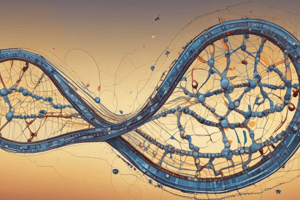Podcast
Questions and Answers
Молекулалық биология тірі ағзалардың даму процестерін зерттейді.
Молекулалық биология тірі ағзалардың даму процестерін зерттейді.
False (B)
Эволюция тірі организмдердің ұрпақтан-ұрпаққа берілетін белгілерінің өзгеруі.
Эволюция тірі организмдердің ұрпақтан-ұрпаққа берілетін белгілерінің өзгеруі.
True (A)
Жасуша теориясы барлық тірі ағзалар жасушалардан тұрмайды деп тұжырымдайды.
Жасуша теориясы барлық тірі ағзалар жасушалардан тұрмайды деп тұжырымдайды.
False (B)
Экология организмдер мен олардың қоршаған ортасы арасындағы өзара әрекеттесуді зерттейді.
Экология организмдер мен олардың қоршаған ортасы арасындағы өзара әрекеттесуді зерттейді.
Өсу және даму тірі ағзалардың мөлшері мен күрделілігінің уақыт өте келе азаюын қамтиды.
Өсу және даму тірі ағзалардың мөлшері мен күрделілігінің уақыт өте келе азаюын қамтиды.
Гомеостаз - бұл организмнің сыртқы өзгерістерге қарамастан тұрақсыз ішкі ортаны ұстап тұру қабілеті.
Гомеостаз - бұл организмнің сыртқы өзгерістерге қарамастан тұрақсыз ішкі ортаны ұстап тұру қабілеті.
Физиология организмдердің әртүрлі бөліктерінің, жасушалардан бастап мүшелер жүйесіне дейінгі функцияларын зерттейді.
Физиология организмдердің әртүрлі бөліктерінің, жасушалардан бастап мүшелер жүйесіне дейінгі функцияларын зерттейді.
Метаболизм - тірі организмдердің энергия алу және пайдалану үшін химиялық реакцияларды орындауы.
Метаболизм - тірі организмдердің энергия алу және пайдалану үшін химиялық реакцияларды орындауы.
Flashcards
Биология
Биология
Тіршілік иелерін, олардың құрылымын, функцияларын және өзара әрекеттестіктерін зерттейтін ғылым.
Клетка теориясы
Клетка теориясы
Барлық тіршілік иелері клеткалардан тұрады, клеткалар құрылым мен функцияның негізгі бірлігі.
Эволюция
Эволюция
Генетикалық ерекшеліктердің өзгерісі, популяциялармен уақыт бойынша.
Гомеостаз
Гомеостаз
Signup and view all the flashcards
Метаболизм
Метаболизм
Signup and view all the flashcards
Репродукция
Репродукция
Signup and view all the flashcards
Адаптация
Адаптация
Signup and view all the flashcards
Энергия ағымы
Энергия ағымы
Signup and view all the flashcards
Study Notes
Introduction to Biology
- Biology is the scientific study of life and living organisms, encompassing various aspects, including their structures, functions, growth, evolution, distribution, and interactions.
- It encompasses a wide range of disciplines, ranging from molecular biology to ecology, each with its own focus and methodology
Branches of Biology
- Molecular Biology: Examines the structure and function of biological molecules, such as proteins, nucleic acids (DNA and RNA), and carbohydrates.
- Cell Biology: Focuses on the structure, function, and interactions of cells, the fundamental units of life.
- Genetics: Studies heredity, inheritance, and the mechanisms of genetic variation.
- Developmental Biology: Explores the processes by which organisms grow, develop, and differentiate from a single fertilized cell.
- Evolutionary Biology: Investigates the processes that lead to the diversity of life on Earth and the relationships between different species.
- Ecology: Studies the interactions between organisms and their environment, including population dynamics, communities, and ecosystems.
- Physiology: Investigates the functions of different parts of organisms, from cells to organ systems.
- Biochemistry: Studies the chemical processes within and relating to living organisms.
Key Concepts in Biology
- The Cell Theory: Proposes that all living things are composed of cells, cells are the basic units of structure and function in living organisms, and cells arise from pre-existing cells.
- Evolution: The change in heritable characteristics of biological populations over successive generations. This is driven by mechanisms like natural selection.
- Homeostasis: The ability of an organism to maintain a stable internal environment despite external changes.
- Energy Flow: The transfer of energy through ecosystems. Food chains and webs represent energy transfer.
Characteristics of Living Organisms
- Organization: Living organisms exhibit a complex hierarchical structure, from molecules to organisms.
- Metabolism: Living organisms perform chemical reactions to acquire and use energy.
- Reproduction: Living organisms produce offspring, either sexually or asexually.
- Growth and Development: Living organisms increase in size and complexity over time.
- Adaptation: Living organisms develop traits that help them survive and reproduce in their environment.
- Response to Stimuli: Living organisms react to changes in their environment.
- Heredity: Living organisms pass on genetic information to their offspring.
Scientific Method in Biology
- Scientific inquiry relies on observation, hypothesis formulation, experimentation, data analysis, and conclusion drawing.
- The hypothetico-deductive approach is central, involving formulated hypotheses and testing their validity through experiments. Controlling variables is crucial.
- Peer review and critical evaluation of findings are essential components of the scientific process.
Biological Macromolecules
- Four major classes: carbohydrates, lipids, proteins, and nucleic acids. Each plays unique roles in biological processes.
- These molecules are composed of smaller monomers linked together to form larger, complex structures.
Studying That Suits You
Use AI to generate personalized quizzes and flashcards to suit your learning preferences.
Description
Биология - тірі организмдердің құрылымын, функцияларын, өсуін, эволюциясын және таралуын зерттейтін ғылым. Ол молекулярлық биологиядан экологияға дейінгі көптеген пәндерді қамтиды. Әрбір салада өзінің әдіснамасы мен ерекшеліктері бар.




